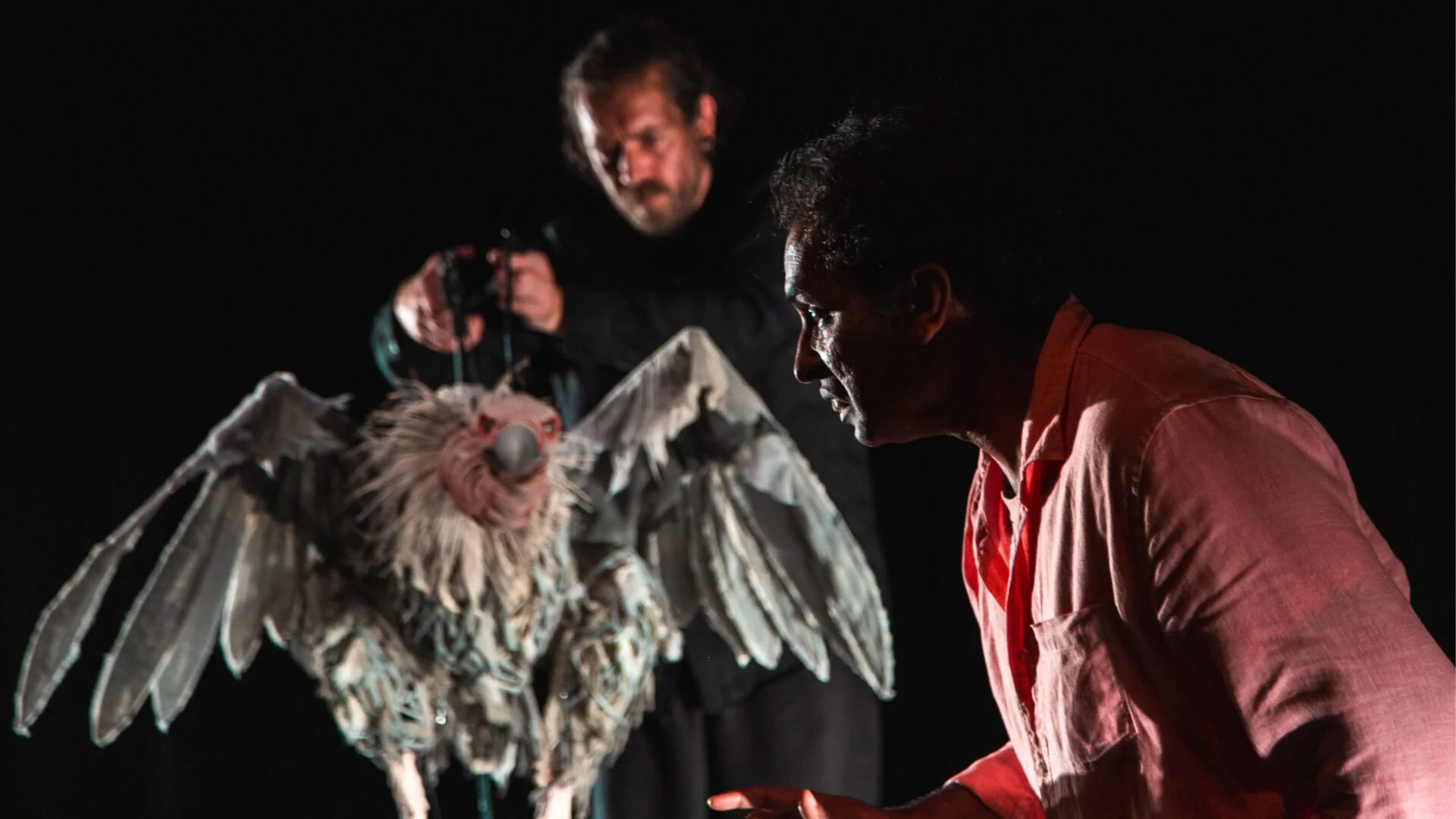Theatre review: Paradise or the Impermanence of Ice Cream weaves existential questions into an epic tale
Jacob Rajan hands in an unforgettable performance in multiple roles, joined by a majestic vulture puppet
Paradise and the Impermanence of Ice Cream. Photo by Ankita Singh
The Cultch presents Paradise or the Impermanence of Ice Cream until April 2
INDIAN INK’S engaging Paradise or the Impermanence of Ice Cream features Jacob Rajan as an unusual protagonist called Kutisar, a dead man who lives through his memories while vultures eat away his body.
Inspired by Ernest Becker’s Denial of Death, the play weaves existential questions into an epic tale delivered with the one-man army Rajan adeptly taking on multiple roles.
As Kutisar reflects back on his life, Rajan is in a league of his own as he portrays men and women of different ages, one after the other, and nonchalantly builds a world around them. He plays Kutisar’s old love interest, Meera; a bouncer; Meera’s auntie; Meera’s cousin; a moneylender; a doctor; and a museum director.
Kutisar meets Meera at a party, after which she takes him to the Towers of Silence where her grandfather’s body has been left for vultures to feed on in an ancient death ritual. Parsis, a community of Zoroastrians who settled in India around the seventh century, leave their dead to be devoured by birds of prey as a final act of charity and to avoid contamination of the soil.
Meera says that an angel watches over the dead for three days, while the soul is still in the body. During this time, those who have been good are reminded of all the positive moments of their lives, while the bad are tormented with negative memories. The play explores how there is no way of guaranteeing a win on Judgment Day; one can only try to be good. It becomes clear that what humans consider freedom of action is often a cage of some kind.
Grappling with her beloved grandfather’s death, Meera is adamant about keeping his legacy alive by running his ice cream shop but struggles to keep the shop’s old-school charm. Kutisar offers her new ideas and wins a 50 percent share in the business, hoping to repay a moneylender for a failed business venture. Meera is as ambitious as the play itself, and her aspirations steer her far from the world she grew up in.
Unfortunately, there are almost no vultures left in Mumbai, making it hard for Parsis to keep their funeral traditions alive. This leads Meera’s auntie to find an eccentric way to dispose of her husband’s body while leading Meera into realizing her passion for science and research.
Rajan, who also cowrote the script, changes voices and accents like one changes TV channels, becoming new characters in the blink of an eye and going back and forth between them with impeccable control over voice modulations and body language. Every character comes with humorous idiosyncrasies, from the protagonist’s tomfoolery to the moneylender’s dull-witted apathy. Rajan’s facial expressions command the audience members’ attention: one tiny twitch can make them burst with laughter.
The writing by Rajan and Justin Lewis (who also directs) is no less remarkable than the performance. It finds clarity around complex existential problems of freedom and imprisonment, control over one’s life, belonging, the “human situation”, one’s legacy after death, and obviously, denial of death. Humour and drama are a means to an end—that is, death.
The hyperrealistic design of the vulture deserves praise, too, as does puppeteer Jon Coddington, who does a great job of bringing to life the bird of prey’s majestic appearance. The minimalist set and sound design provide the perfect amount of world-building, leaving ample space for imagination.
The play has the allure of a rom-com and the ending of a revenge tragedy. Saving some of its most jaw-dropping revelations for the final moments, the play questions whether humans genuinely despise death and if life is worth celebrating. Are tiny moments of kindness and laughter all that there is worth living for? While there might be no way of living with the reality of death, there is no denying that Rajan has built his legacy through this landmark solo performance.














